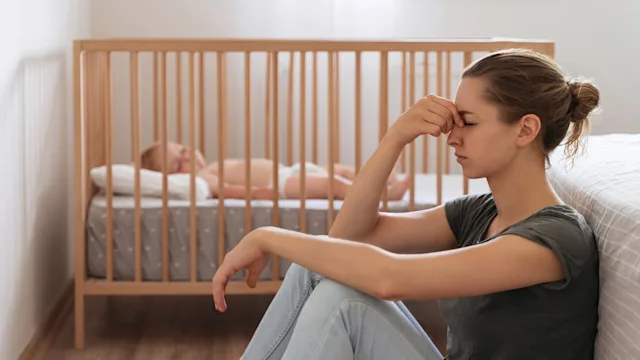Key takeaways:
Hearing loss and depression often go together.
Treating both can be complicated.
Self-care and support from loved ones helps.
Ray Schaefer has dealt with depression and other mental health conditions for many years. And in the past few years he has noticed that his mild hearing loss has grown worse.
Until recently, he did not know the two conditions can be linked.
“I never thought of the connection between hearing loss and mental health,” Ray says.
Search and compare options
Scientific studies show hearing loss and depression can occur together, because hearing loss can leave a person isolated from loved ones and the world around them.
Ray is 67 and worked in the daily newspaper business for decades. Today, he is a sports writer for a pair of local news outlets near his home in Kentucky, where he lives with Sally, his wife of more than 32 years.
Ray describes his hearing loss as moderate, although he knows it is getting worse.
The hearing loss has come about slowly. “About 20 years ago, Sally noticed my voice gets louder, and I’m turning the TV up quite a bit louder,” he says. “And when I have the headphones on — listening to my podcasts and such. She sometimes can hear because it’s so loud.”
In the past, he suffered vestibular neuritis, an inner-ear disorder believed to come from a virus. He takes several medications for diabetes and cardiac conditions, as well as antidepressants.
Ray keeps track of his complex medication schedule with the help of his wife. “She has a nursing background,” he explains. “Once a nurse, always a nurse.”
He considers his mental health condition manageable.
“I’ve never been suicidal,” he says. “The closest I came was some three or four years ago, when I walked to a bridge nearby and kind of stared at the water over the river. I just walked away. Sally and I made a promise that we wouldn’t do that to each other. I remembered that promise.”
Hearing loss complicates his work life
Hearing loss affects Ray’s work “profoundly,” he says. He has given up “the old-fashioned reporter’s notebook, because I miss things,” he says.
“Sometimes a person is asking a question or answering a question, and I completely miss what the person is saying. That is off-putting to a source. Now, I have to record everything on my phone,” he says.
At times, he says, “I hear something or I see something, and I miss it, And I’m asking somebody in the press box, ‘What happened? What happened?’ Or ‘What did they say? What did the PA guy say?’
“Oh, it’s embarrassing. And off-putting to people around me. So, yeah, it makes me feel terrible.”
He also notices the effects of the hearing loss in other ways. “I’m not as quick to catch things as I was, too.” During interviews, reporters pay attention to tone, hesitancy, or other vocal cues. “I’m not always quick to pick up on that, and to follow up on that to try to find out what’s going on,” Ray says.

The hearing loss has even affected Ray's behavior around people he knows well.
“I tend to be a little more guarded around other people,” Ray says. “I’m afraid to say something that I don’t mean” out of misunderstanding, he explains. “I’m afraid I’ll miss something they tell me.”
When he misunderstands a question and answers wrong, Ray says, “Then I start to feel anxious and depressed about that.”
Noisy situations pose problems
Ray dislikes visiting grocery stores and other crowded, noisy places. “The sound, it overwhelms me,” he says. “It sounds like static.”
He had the same sensation with hearing aids he wore a while back. “The wind kind of makes everything sound like static,” he says.
He does plan to get newer, more sophisticated hearing aids soon. He is waiting for his Veterans Administration insurance to approve them.
Both his audiologist and a neurologist told him that parts of the brain could atrophy from hearing loss. The audiologist told him that process can be offset by using hearing aids.
While Ray is not in mental health treatment right now, he went into therapy a few years ago. It lasted for several months.
“It helped me look for things that I can do that helped me become comfortable in situations,” he says. “We talked about getting involved in more activities. Because I want to isolate myself if I’m going through anxiety and depression.”
Self-care helps
Ray also makes a point of doing things that make him feel better, like listening to music.
“Everything from classical to ’60s rock, that relaxes me,” he says. “As a child, I would listen to the radio and it would allow me to sleep. Now, I cannot I cannot sleep in a totally silent room. Whether it’s a podcast or NPR or something, I have to have it to lull me to sleep.”
Also, he says, he’s doing lots of little things to take better care of himself and his mental health. “I’m eating healthier. I’m taking better care of my blood sugar. I try to swim as often as I can and walk as often as I can. And I’ve dropped that 40 pounds. I feel pretty good most days.”
Whenever he needs a little help, Ray says, he knows where to turn. “Every couple of weeks, something will happen and I’ll start to feel anxious. But Sally and I talk about it, and that helps.”

Why trust our experts?

















